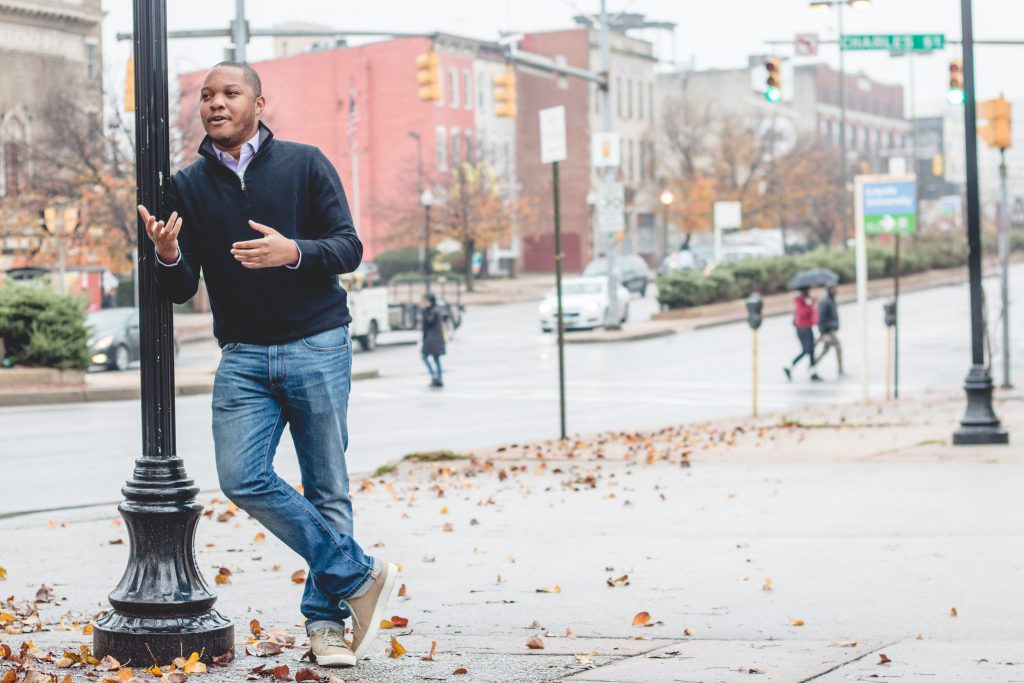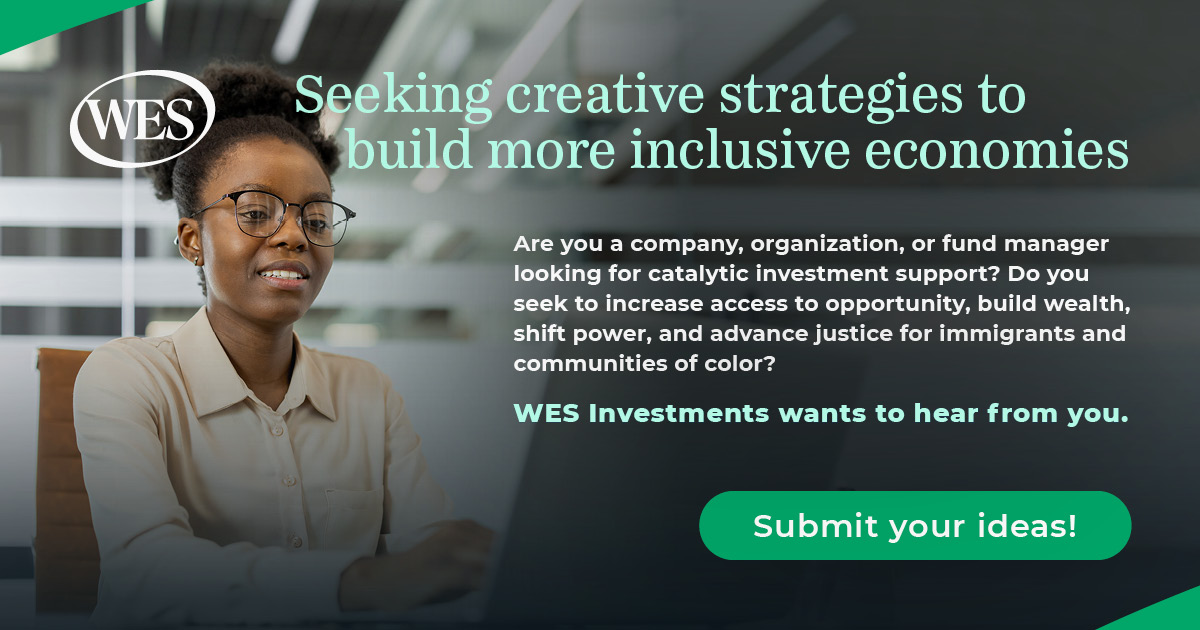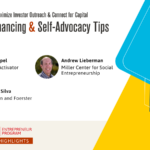Growing up in Baltimore, Rodney Foxworth came face-to-face with the social and economic issues that dominate the news today. “The city represents much of the decline in the American dream: post-industrialization, the war on drugs, an emphasis on the prison system/policing, the lack of opportunity in jobs, and, of course, the erosion of public education,” he says.
As a college student, Foxworth worked as a freelance journalist, covering community issues in Baltimore that ranged from mass incarceration and unemployment to failing public schools, but he yearned to be part of the story. “I wanted to be able to effect some kind of change,” he recalls. “ I felt the need to be a part of the solution.”
After a stint at Baltimore’s Abell Foundation and a local nonprofit focused on workforce development, Foxworth joined the Knight Foundation’s Black Male Engagement initative, now called BMe, which operates in Philadelphia, Detroit, Baltimore, Miami, Pittsburgh, and Akron. He dovetailed his experience supporting Black men in their community engagement initiatives with his own consulting firm, Invested Impact, where he leveraged philanthropic and private-sector dollars to lift up entrepreneurs of color.
In 2016, his efforts attracted the attention of the Business Alliance for Local Living Economies (BALLE). The collective of communities, entrepreneurs, and funders seeks to “defy business as usual” and “create local economies that work for all.” Foxworth linked up with BALLE as a 2016 member of its lauded Economy Fellowship. He now serves as executive director of the Oakland, California-based group.
We sat down with Foxworth to learn more about his roots in Baltimore, his career in social impact, and how his new role at BALLE ties it all together.

Rodney Foxworth, photo by Olivia Obineme
What led you to your role at BALLE, and how do you see yourself in the alliance’s mission to create local economies that work for everyone?
Rodney Foxworth: My story starts in Baltimore, where I grew up in a working-class African-American household and was the first in my family to go to college. Every day, I saw my parents get up, go to work, and work really hard. In America, you often hear, “If you work hard and you do the right things, you will succeed.” But I saw that this dream wasn’t true for so many people, particularly minorities. Most people are hard-working folks, but the system doesn’t offer opportunities for their hard work to turn into material success or comfort and security.
Seeing the “dream deferred” that Langston Hughes wrote about shaped my personal and professional orientation, and it got me thinking about what an American community can be.
What is the difference you are trying to make in the world, both in your role at BALLE and in life?
RF: I want to eliminate racism, sexism, and classicism. I want everyone to be able to live in a world in which you’re not defined by class, race, or gender. It permeates our daily activities in ways that are so unnoticeable. My big goal is to do my part in helping to dismantle and deconstruct these reductive power structures.
How do you see the role of business and investment in breaking down barriers around race, class, and gender?
RF: I see business as both a driver of and adversely impacted by things like racism, sexism, and classicism. In the US, for example, we have these tremendous racial and gender wealth gaps. There are so many different disparities related to ownership of minority businesses and the kind of wealth that those minority business owners accrue. When we look at the investment side of things, fund managers of color face a disproportionate number of barriers to even enter the industry.
From Jim Crow and before that, opportunities were inaccessible to certain minority groups — and business had a negative role in those days. Capital, wealth, and business have played a tremendous role in creating injustice.
“There’s a lot of opportunity for us to drive equitable wealth in this country, but it does require sacrifice.” — Rodney Foxworth
What do you feel needs to happen in order to move business from an enabler of injustice to an agent for positive change?
RF: Coming from a place like Baltimore, you live the data. You don’t have to look at the statistics, because you know. But when you do look at some of that data, it’s clear that it will take quite a combination of concessionary capital, philanthropy, and other methods to be able to unravel the wealth disparity we have in the US.
I often question: why does a foundation, for example, need to be a perpetual institution? How can philanthropies invest in wealth-creating vehicles that support people who have been most impacted by social injustices? I want to see philanthropic groups look toward investing in the capacities of those individuals while making their own wealth accumulation a secondary consideration.
Philanthropists and impact investors need to figure out how they can leverage their own wealth and investment to spur the wealth and investment of other groups that have been marginalized. To do that, they might have to give something up — whether that means a lower return on investment or no return on investment, but that’s not uncharted territory.
When I look at certain things like the venture capital space, where 75 percent of venture capital doesn’t even return to investors, I see a huge opportunity for re-imagining and rethinking how we look at capital investment. There’s a lot of opportunity for us to drive equitable wealth in this country, but it does require sacrifice. It requires consideration for not necessarily maximizing your capital investment, but ensuring that there’s a dual or triple purpose. If your investment is able to, say, create more wealth in a place like Jackson, Mississippi, in a southern, majority African-American place, that’s a solution in and of itself.
“When, for example, people of color become the majority in the US, what does it look like when Latinxs, African-Americans, and other minority groups do not have the type of household income and wealth that will be able to sustain the US economy?” — Rodney Foxworth
Do you encounter resistance when you tell funders and philanthropists that they might have to accept lower returns in order to maximize impact? What do you tell people who might disagree?
RF: With today’s levels of wealth disparity, we have to figure out ways we can maximize the wealth accumulation of those who have been most marginalized — before we do anything else. When, for example, people of color become the majority in the US, what does it look like when Latinxs, African-Americans, and other minority groups do not have the type of household income and wealth that will be able to sustain the US economy? What does it look like when the majority of our people have a fraction of the wealth and household income to which we’ve become accustomed?
A scenario like that presents tremendous downsides for all of us, as an economy, and that’s the point I try to drive. We’ve done a great job maximizing wealth for those who have it. At the same time, we’ve got to figure out vehicles in which we can maximize wealth for those who have been impacted by centuries of inequities.
I certainly understand and believe that one can make a financial return while investing in something that produces a social good. However, there are plenty of things that need capital that actually will not make a return on investment. We still need those investments to happen. Otherwise, we’ll continue to have whole communities that are not able to obtain wealth and sustain themselves, which is what we have today.
“Philanthropists and impact investors need to figure out how they can leverage their own wealth and investment to spur the wealth and investment of other groups that have been marginalized.” — Rodney Foxworth
You’re talking about impact-driven investments that don’t necessarily yield a financial return. Don’t we have a system for that? Isn’t that called nonprofit or philanthropy? What makes your perspective different?
RF: For one, philanthropy is not large enough asset class. Second, it’s framed as a goodwill endeavor that’s more akin to charity. What I’m speaking of is an economic question that even self-interested investors may be interested in.
For example, African-American women are a growing consumer market in the US, and they represent America’s fastest-growing entrepreneurial population. Yet, because of all the disparities and “-isms” they face, many African-American women don’t have access to the same resources as some of their White male counterparts. There’s an economic opportunity in removing those barriers, but you’ll have to over-invest at some point in order to unlock that opportunity. You might have to spend more up front to pave the way for those entrepreneurs to make the kind of return that you would like to see.
Philanthropy is not large enough to address an economic question like that. We need to identify the opportunities to make investments in marginalized communities so that philanthropy can be a leader in partnership with other capital providers, but we need more folks at the table.
Can you offer an example of a non-philanthropic investment that can have a big impact but isn’t necessarily expected to generate a high immediate return?
RF: I try to focus on the station between philanthropy and investment. For example, even though venture capitalists invest with the goal of making an outsize return, by and large they don’t do
that with every single deal. They make most of their money from a handful of deals or one unicorn. I’m suggesting that investors consider the longer-term impacts beyond maximizing their financial return. Our economy will accrue other benefits if investors look toward areas where there has been little to no investment before, or even extractive investment.
There are parts of the country that have very little investment, but they hold vast opportunities for investors in the long term. Still, investors have to be patient and spend money at the front end before they’ll be able to see those returns.
Take what Jessica Norwood is doing with The Runway Project, an investment fund that backs African-American entrepreneurs as well as educational programs in rural communities. These are not high returns. It’s patient capital. You’re making meaningful investments that will return something to you, and although you won’t get a 15 percent return on your investment, there are still long-term opportunities there.
How does BALLE put these concepts into practice?
RF: The 2018 cohort of BALLE Fellows is made up of leaders from rural communities. Lifting up rural leaders is extremely important to us simply because Americans don’t often think about the entrepreneurial innovation that happens in rural areas. We typically look to the coasts or to major municipalities, but we don’t think of rural communities as hubs of creation. Even without that recognition, entrepreneurial leaders are doing great things in these communities — and fantastic opportunities can come from investing in their efforts.
For example, one of our Fellows organized a sustainable farming group in DeWitt, Arkansas. Effectively, the model creates a value chain around sustainable farming and energy-efficient biofuels in a 3,000-person town. They’ve been able to create jobs, expand upon farming opportunities, and bring on a generation of people who can engage in this industry. This kind of activity is happening in rural areas across the country, but it remains a blind spot for investors.
What is the best leadership advice you give or have received?
RF: The best advice I’ve ever gotten is to be humble. Listen more than you talk. Take the time to understand what people are feeling and how things impact them, and commit to be in service to people. Then, everything else falls in place.
Particularly if you are a business leader or an entrepreneur, your task is to hire and call together people who are better and smarter than you. If you are consistently the smartest person in the room, you probably won’t have a successful organization — whether that’s a for-profit business, a social change enterprise, or a nonprofit. To succeed, you need to surround yourself with people who are smarter than you are, and you need to center respect for those people and help them be the best they can be.
What gives you hope?
RF: Communities across this country and around the world are so hard-hit by economic injustices, yet people continue to push forward. I can’t help but be optimistic because I see folks like Jessica Norwood persevere and create opportunity where there might not have been before.
I am inspired by the fact that we have foundation and corporate leaders who are able to take the stands and put forth the investments that are required for the change we need today. It might sound trite, but I’m inspired by people who are strong and talented — and the BALLE leadership network is full of them. I wake up motivated every day to be in service to them.
We are 50 years out from Martin Luther King, Jr.’s assassination, and it’s game-changing for me to reflect on the level of commitment that a person has to have in order to drive change. It makes me want to double down, while also recognizing how hard it will be. People sacrifice every single day to make our communities and our world better, and we have to continue doing this work.
Interested in continuing the conversation on racial equity? Make sure to attend SPECTRUM, the premier gathering of multicultural changemakers creating an inclusive impact economy, June 12-13, 2019 at The Gathering Spot in Atlanta, GA.




